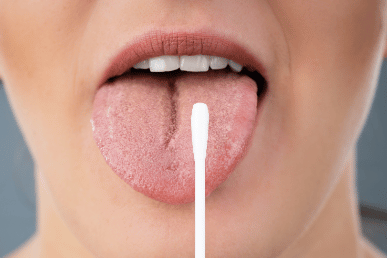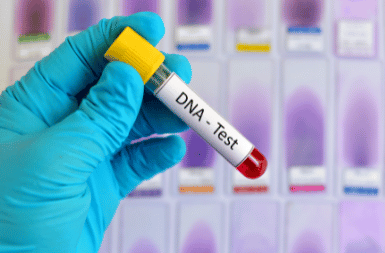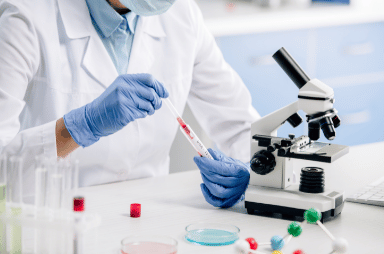
Whenever someone brings up DNA test prices in Nigeria, it often sparks tension for obvious reasons. DNA testing has become almost synonymous with exposing paternity fraud, a reality that has shaken many marriages and relationships.
But at its core, DNA testing is about clarity. Everyone deserves to know the true paternity of their child. Not just for peace of mind, but for important medical and legal reasons too.
In this article, we’ll break down the cost of DNA tests in Nigeria, where you can get them done, and the many other purposes DNA testing serves beyond paternity.

DNA which is a shortened form of Deoxyribonucleic acid is the hereditary material in humans that carries their genetic information for development and functioning.
Put simply, a DNA test is a diagnostic test that reveals changes to your chromosomes, genes, or proteins. These mutations can reveal whether you have a genetic disorder or not.
The test can also determine your likelihood of contracting a certain disease or passing on a genetic disorder. DNA testing or Genetic testing is used interchangeably in a sentence to mean the same thing.
In layman terms, DNA testing/genetic testing is a method of determining the genetic makeup of an individual. It is used for a variety of purposes, including genetic screening, paternity testing, ancestry testing, and forensic analysis.
DNA testing awareness in Nigeria is growing rapidly as it’s used to solve a variety of legal and social problems in the following ways:
Depending on the reasons and tests to be carried out, DNA/Genetic tests are done by collecting samples from the buccal cells using Cheek swap. Hairs, blood samples and amniotic fluid (from the fetus in the womb) are also collected.
These samples are sent to the lab for screening, analysis and confirmation.
Unlike in yesteryears, DNA testing in Nigeria has become popular and the number of people taking it has increased in recent times.
Some of the factors that influenced the DNA test prices in Nigeria increase include:
There are now several companies that offer the services in many cities, both locally and internationally. This has made DNA test prices in Nigeria more convenient and affordable.
Nigerians are becoming more aware of the benefits of DNA testing, such as the ability to determine paternity, establish ancestry, and identify genetic disorders. This has led to an increased demand for DNA testing services.

Generally speaking, DNA test price in Nigeria is now affordable. According to our research, as of 2025, the cost of a DNA test in General Hopsital is between the range of 150,000 –400,000 naira only.
However, note that the cost of DNA tests in Nigeria varies depending on the type of test, the number of people being tested, and the laboratory that is performing the test.
According to available information, the standard cost of DNA test in LUTH (Lagos University Teaching Hospital) is approximately ₦150,000 to ₦400,000.
It’s important to note that these prices are subject to change, and different sources report varying figures. To avoid guess work, it’s advisable to contact LUTH directly for the most accurate and up-to-date pricing information. You can use the phone number on their website: 08070591395.
Here’s a breakdown of the cost of each of the DNA testing:
The peace of mind paternity test is a non-legal test that is used to determine whether a man is the biological father of a child. The cost of a peace of mind paternity test in Nigeria typically costs between 150,000 and 400,000 Naira.
A legal paternity test is a more rigorous test that is admissible in court. This test is used in court cases to determine paternity. It is more expensive than a peace of mind test, typically costing between 200,000 and 500,000 Naira.
This test is used to determine whether two or more people are siblings. The test is done by comparing the DNA of the individuals to each other. It typically costs between 150,000 and 200,000 Naira.
This test is used to determine if a grandparent is the biological grandparent of a child. It typically costs between 150,000 and 200,000 Naira.
This test is used to determine a person’s ancestral origins. The test is done by comparing the DNA of the individual to DNA samples from different populations around the world. It typically costs between 100,000 and 150,000 Naira.
There are a few affordable options for DNA testing here. One option is to use a home DNA testing kit. Home DNA testing kits are available for purchase online and in some pharmacies. The cost of a home DNA testing kit ranges from N50,000 –100,000 naira.
Another option for affordable DNA tests in Nigeria is to use a government health laboratory. Government health laboratories offer DNA testing at a discounted rate. The cost of DNA testing at a public health laboratory ranges from 100,000 –220,000 naira.
Rhesus Factor Compatibility: A Comprehensive Guide
Blood Group Compatibility Chart for Marriage
Why is Palm Oil Bad in Baby Formula

DNA testing is a powerful tool that can be used to improve your health and well-being in many ways. Here are some of the benefits of DNA testing:
Disease prevention: DNA testing can help you identify your risk for developing certain diseases, such as cancer, heart disease, and diabetes.
This knowledge can help you take steps to prevent these diseases, such as making lifestyle changes or getting regular screening tests.
Personalized healthcare: DNA testing can help you tailor your healthcare to your individual needs. For example, if you know that you have a genetic mutation that increases your risk of developing a certain disease, you can talk to a qualified doctor to develop a prevention plan or to choose the best treatment options if you already have the disease.
Identifying genetic heritage: DNA testing can help you learn about your genetic heritage, which can give you insights into your ancestry, health risks, and your responses to certain medications.
In addition to these benefits, DNA testing can also be used to screen newborns for genetic disorders, Assess the likelihood of compatibility for organ donation and investigate criminal cases.

DNA testing laboratories that are accredited by a recognized international organization, such as the International Organization for Standardization (ISO), are held to higher standards of quality and accuracy.
This can lead to higher costs for tests as these laboratories have to invest in more rigorous testing procedures and quality control measures.
The type and complexity of the DNA test can also affect the price. For example, a paternity test is generally less expensive than a test for genetic disorders.
This is because paternity tests only need to compare the DNA of the child and the alleged father, while genetic disorder tests need to analyze a much larger number of genes.
The sample collection method can also affect the price of a DNA test. For instance, cheek swab samples are the most common and least expensive method of collecting DNA. Other types of samples, such as blood, hair, and fingernails, can also be used. The cost of these is usually higher.
Some DNA testing companies offer additional services and analysis, such as genetic counseling or ancestry tracing. These services can add to the cost of the DNA test.
The geographic location of the laboratory and the accessibility of the testing facility can also affect the price of a DNA test. DNA tests that are conducted in remote areas or that require overnight shipping may be more expensive.
In a competitive market, laboratories may be more likely to offer lower prices to attract customers. However, in a market with high demand, prices may be higher due to increased demand.
In summary, the factors affecting DNA test prices in Nigeria are complex and can vary depending on the specific test being performed. However, the factors listed above are some of the most common factors that can affect the price of a DNA test in Nigeria.
Paternity Testing: This is the most common type of DNA test in Nigeria. It is used to determine whether a man is the biological father of a child. The test is done by comparing the DNA of the child to the DNA of the alleged father.
In most cases, paternity testing is performed after the child is born. The procedure is known as postnatal DNA paternity testing.
Doing a DNA test before a child is born is also possible but more expensive and can be harmful to the baby. Thus, the common, secure, affordable, practical, and non-invasive kind of paternity testing is done after birth.
Maternity Testing: This test is used to determine whether a woman is the biological mother of a child. The test is done by comparing the DNA of the child to the DNA of the alleged mother.
Carrier Screening: This test is used to determine whether a person is a carrier of a genetic disorder. Carriers of genetic disorders do not have the disorder themselves, but they can pass the disorder on to their children.
Preimplantation Genetic Diagnosis (PGD): This test is used to screen embryos for genetic disorders before they are implanted in a woman’s uterus. PGD can help to prevent the birth of children with genetic disorders.
Newborn Screening: This test is used to screen newborns for a variety of genetic disorders. Newborn screening is done by taking a small blood sample from the baby’s heel.
DNA Fingerprinting: This is a type of DNA testing that is used to identify individuals. DNA fingerprinting is used in a variety of forensic applications, such as criminal investigations and paternity disputes.
DNA Typing: This is a type of DNA testing that is used to determine the genetic profile of an individual. DNA typing is used in a variety of forensic applications, such as criminal investigations and paternity disputes.
DNA Evidence Collection: This is the process of collecting DNA evidence from a crime scene. DNA evidence can be collected from a variety of sources, such as blood, saliva, hair, and skin cells.
A. Accreditation and Certification
DNA testing is a complex and sensitive procedure, so it is important to choose a provider that is accredited and certified by a reputable organization. Some of the most recognized accreditation bodies for DNA testing include:
B. Testing Accuracy and Quality Assurance
In addition to being accredited and certified, a good DNA testing provider will have a strong commitment to accuracy and quality assurance. This means that they will use state-of-the-art equipment and methods, and they will have a rigorous quality control program in place.
C. Privacy and Data Protection
DNA testing is a personal and sensitive procedure, so it is important to choose a provider that will protect your privacy and data. Make sure to ask about the provider’s privacy policy and how they will store and use your DNA data.
D. Turnaround Time for Test Results
The turnaround time for test results can vary depending on the type of test and the provider. However, you should be able to get your results within a few weeks of submitting your sample.
E. Customer Support and Aftercare Services
If you have any questions or concerns about your DNA test, you should be able to get help from the provider’s customer support team. Make sure to ask about the provider’s aftercare services, such as how they will help you understand your test results.
The cost of a DNA test in Nigerian general hospitals ranges between ₦150,000 and ₦400,000 for standard paternity or legal DNA tests.
In comparison, private clinics and laboratories may charge anywhere from ₦250,000 to ₦600,000 for basic paternity tests, with more advanced or specialized tests costing significantly more, sometimes up to ₦1,500,000.
If you’re considering a government hospital for affordability, it might require additional time for results, so you have to exercise patience, whereas private facilities often provide faster service.
Ensure the facility is reputable for reliable outcomes.
The cost of a DNA test in UCH Ibadan (University College Hospital) ranges from ₦85,000 to ₦230,000.
Although, the price is not publicly listed on the hospital’s website, so it’s best to contact their Universal Laboratory directly for the most accurate and up-to-date pricing.
You can reach them at 08131733447 or 08131734161, or via email at [email protected].

This list shows the Cost of DNA tests in some affordable hospitals and laboratories across Nigeria as at 2024:
DNA testing is a powerful tool that can be used for a variety of purposes, including genetic screening, paternity testing, immigration, and ancestry research.
The most common type of DNA test in Nigeria is paternity testing. This type of test can be used to determine whether a man is the biological father of a child.
After careful research, the cost of DNA tests in Nigeria varies depending on the type of test and the laboratory.
The price of DNA tests in Nigeria also differs based on the number of people being tested. As of 2025, DNA tests in Nigeria cost between ₦150,000 and ₦400,000. Paternity tests typically range from ₦100,000 to ₦250,000, while legal paternity tests can cost between ₦200,000 and ₦500,000. Other types, such as ancestry or siblingship tests, fall within the ₦100,000 to ₦200,000 range. Affordable options include government health labs and home DNA testing kits.
DNA testing can be done in a clinic or at home. The home test kits are more convenient, but you have to send them to the lab as soon as possible for screening and analysis. The results of a DNA test are usually available within a few weeks.
References
MedlinePlus.(2021). How is genetic testing done?
SabiLaw. (2022). Deoxyribonucleic Acid (DNA) Evidence Under Nigeria Law. SabiLaw.
DNA forensics. (2023). Paternity DNA test in Nigeria
healthcareMarch 27, 2023
ParentingSeptember 3, 2020
ParentingSeptember 2, 2020
healthcareFebruary 27, 2025
healthcareAugust 20, 2025








